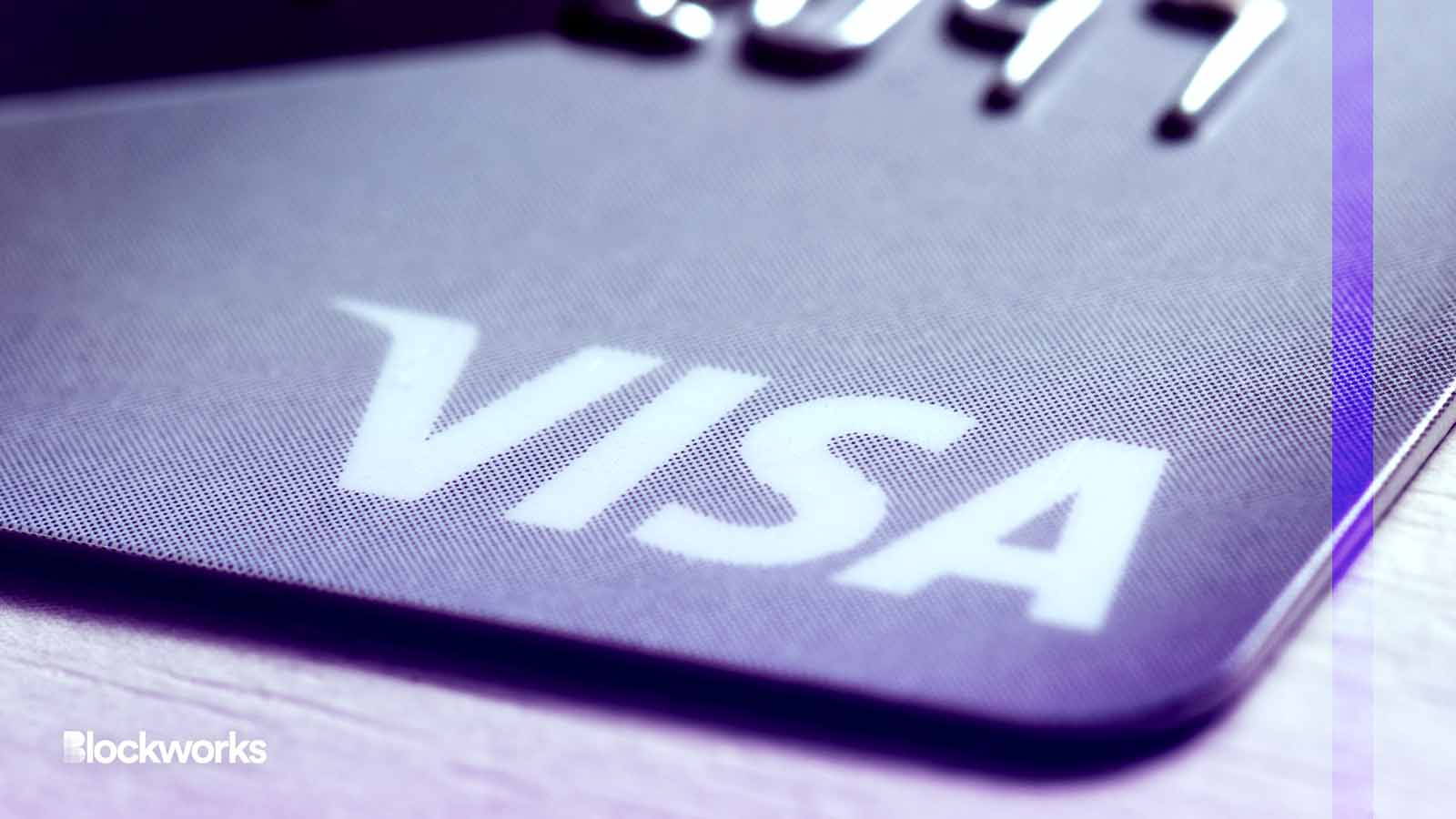Why Visa’s new stablecoin efforts could be a game-changer
“Just a single stablecoin payment at the top of the stack can lead to a compounding set of them further down,” industry CEO says

HJBC/Shutterstock modified by Blockworks
Following Visa’s expansion of its stablecoin settlement capabilities on Tuesday, industry observers believe the company’s efforts with USDC via Solana could catalyze increased adoption in the wider crypto payments realm.
Some of the largest “cross-border e-commerce” players are showing increased interest in blockchain technology as they seek to improve the speed and cost of their payment processes, an industry participant noted.
Visa revealed Tuesday that, as part of pilot programs, it can now send USDC-denominated payouts via the Solana blockchain to Worldpay and Nuvei — merchant acquirers that can then route these payments in USDC to their end merchants.
The increased use of stablecoins has a compounding effect, according to Andy Bromberg, CEO of the Eco App and digital wallet Beam. Now that acquirers like Worldpay and Nuvei are receiving USDC, he added, it makes sense for them to offer USDC payouts to merchants.
“And once merchants get USDC payouts, it makes sense for them to offer to pay their vendors and employees in USDC,” Bromberg told Blockworks. “Just a single stablecoin payment at the top of the stack can lead to a compounding set of them further down, increasing stablecoins’ share of global payments.”
Read more: Why USDC’s market cap is half of what it was a year ago
Cuy Sheffield, Visa’s head of crypto, told Blockworks in an email that the company plans to support additional blockchains in the future.
“And while we are starting with USDC, over time, we may explore adding additional stablecoins to our settlement capabilities to serve our clients and partners,” he added.
New companies likely to enter space
Ran Goldshtein, senior vice president of payments at crypto custody platform Fireblocks, said during a Twitter Space Tuesday that Visa’s latest initiative is “a major milestone” proving that business-to-business money movement via crypto is a focus right now.
Nabil Manji, head of crypto and Web3 at Worldpay, said during the Twitter Space with Goldshtein that crypto-native companies have so far been the first to lean into crypto payments.
But Worldpay is also conversing with large players in the “cross-border e-commerce space” for which payments serve as a huge part of their business, he added — naming Airbnb and Uber as the types of companies that could particularly benefit from blockchain rails.
Such companies deal with taking money from consumers and distributing it to others, such as hosts or drivers.
“While crypto payments aren’t something we’re focused on integrating into the platform in the near future, we’re always looking at all aspects of payments for ways to improve our community’s experience with it, including developments in digital assets and their use cases,” an Airbnb spokesperson told Blockworks Wednesday.
Uber did not immediately return a request for comment. But CEO Dara Khosrowshahi said in a 2022 interview with Bloomberg that the company would accept crypto as a payment option “at some point.”
“Those companies I mentioned and dozens, if not hundreds, of others have absolutely massive payments departments and teams where the ability to get that money to those end recipients can be a differentiator for their platform,” Manji said. “How quickly they can do it and how cheaply they can do it is something they really pride themselves on.”
With the number of countries and currencies some large companies operate in, being able to improve such processes is key, Manji argued — particularly in the current “cost-of-capital environment.”
Airbnb, for example, operates in more than 220 countries and regions and processes roughly $80 billion per year in over 40 currencies, the spokesperson said. Ninety percent of the company’s hosts choose to be paid in their local currency.
“Shaving days or hours off those payments is a big deal when you’re talking the scale that some of those companies operate at,” Manji said.
According to Matt Long, a general manager at the crypto trading platform FalconX, Visa’s incorporation of the Solana blockchain in its latest pilot programs may appeal to businesses looking to optimize payments in terms of time and cost.
“Arguably Solana provides a faster and cheaper chain compared to Ethereum, so it should improve settlement speed for Visa’s use of USDC,” Long said. “By extension, the high-performance nature of Solana might help accelerate stablecoin adoption for other similar use cases.”
Get the news in your inbox. Explore Blockworks newsletters:
- The Breakdown: Decoding crypto and the markets. Daily.
- 0xResearch: Alpha in your inbox. Think like an analyst.






